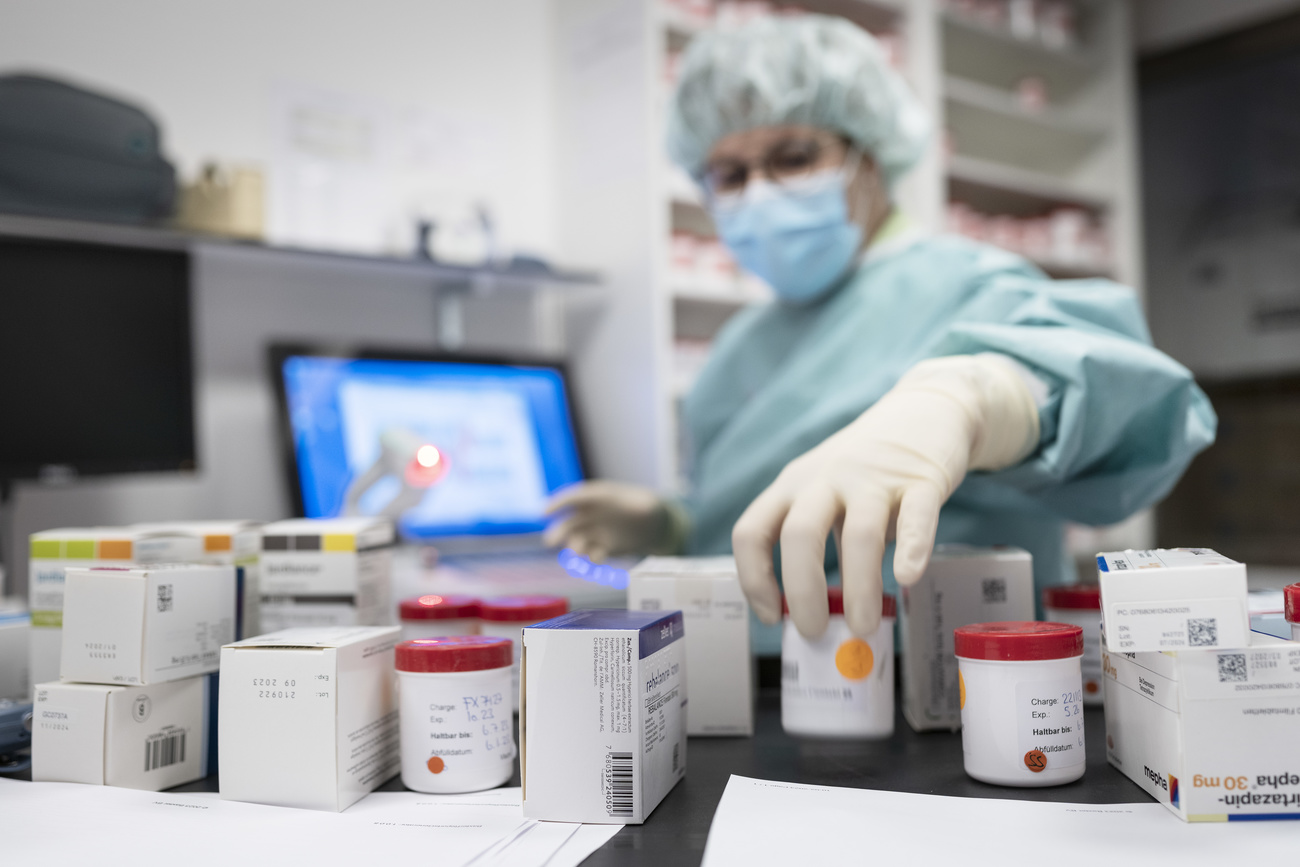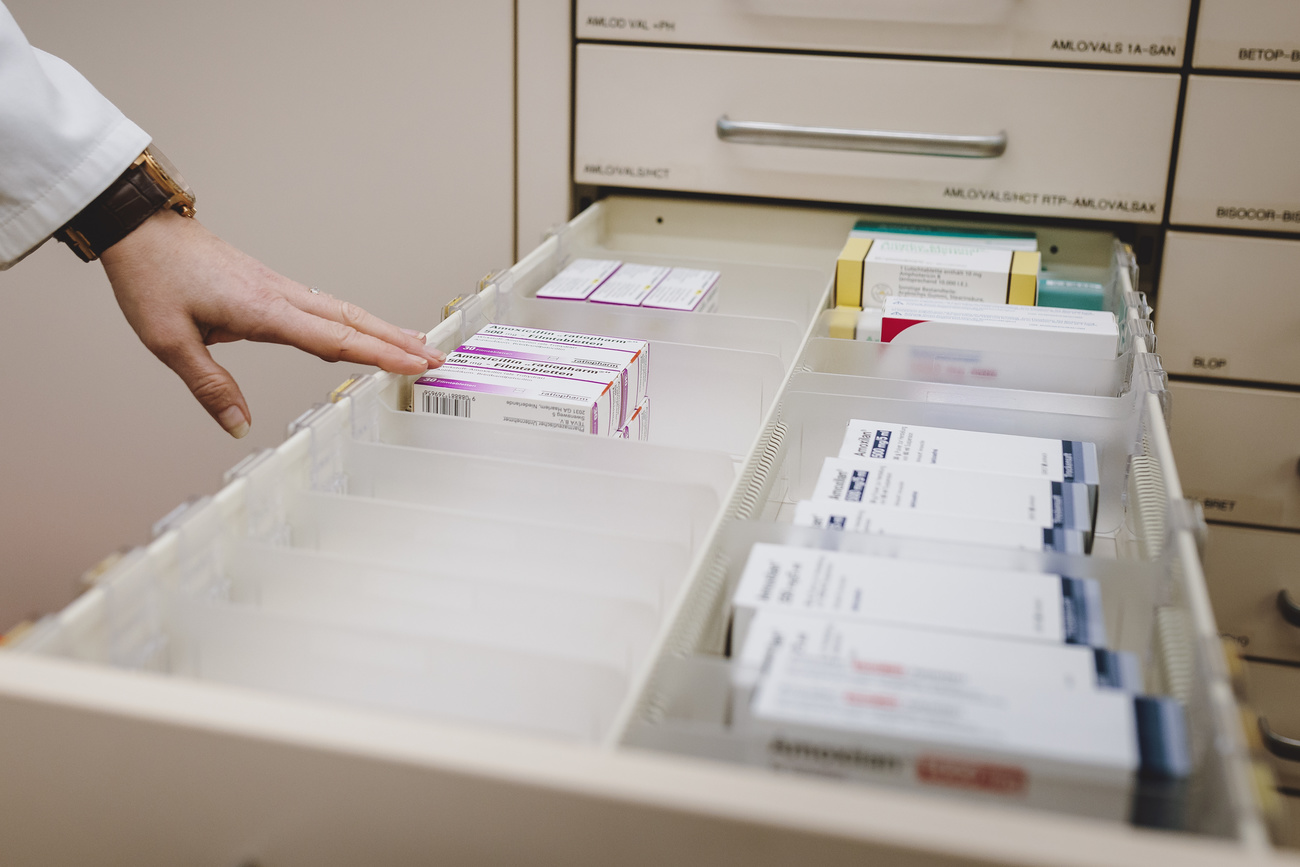
Why Switzerland is running out of pharmaceuticals

Switzerland is an undisputed pharmaceutical powerhouse with two of the biggest drugmakers in the world – Roche and Novartis – and hundreds of smaller biotech firms. How can a country that supplies the world with so much medicine face shortages at home?
For the past three months, Swiss media has been flooded with reports of drug shortages of everything from the antibiotic amoxicillin and common painkillers like ibuprofen to treatments for chronic diseases like Parkinson’s, heart disease and epilepsy.
According to the website drugshortage.chExternal link, created by Swiss pharmacist Enea Martinelli, at least 1,000 prescription drug preparations were “unavailable” in early March compared to around 450 in May 2021. The Federal Office for National Economic Supply (FONES) reported in early March that around 140 essential medicines faced delivery delays, were out of stock indefinitely or completely pulled from the market, compared to 48 in 2017.
“It’s a sad record that we’ve achieved,” Martinelli toldExternal link Swiss public television SRF back in November. By February, Swiss authorities had classified the medicine supply situation as “problematic” and set up a taskforce to come up with immediate remedies.
Drug shortages aren’t new in Switzerland but the range of medicine missing from pharmacy shelves, the speed at which they disappeared, and the duration of the shortages have raised alarm.
“Twenty years ago, we had one shortage per month. Today we are at 4-5 a day. It’s worrying. More than 150 drugs have been out of stock since the beginning of the year,” one hospital pharmacist toldExternal link the French-language paper Le Temps on February 21.
This isn’t unique to Switzerland. Much of Europe is facing severe drug shortages after pandemic-related mask mandates eased, leading to a spike in colds, respiratory infections, and flu cases this winter. Few countries, however, have such a density of pharmaceutical companies, which has left many people in Switzerland scratching their heads.
Blackbox
One of the key reasons that Switzerland has not been able to avoid the drug shortages affecting many other countries is that it does not have a clear, comprehensive overview of the problem, wrote the Federal Office of Public Health in a reportExternal link published last February. The national supply office only tracks what it considers essential medicine. The only other resource is Martinelli’s website on prescription drugs created as an independent initiative, which relies on reporting by manufacturers and pharmacists. This doesn’t cover over-the-counter medications such as cough syrup.
Moreover, different agencies have a view of different parts of the drug supply chain. The main responsibility for meeting patient needs and procuring medicine sits with each canton but the federal health department is responsible for pricing and reimbursement. Then there is the national supply office, which tracks and stockpiles essential goods and the national medicines regulator Swissmedic, which is tasked with drug approvals, patient safety monitoring, and manufacturing practices.
This makes it difficult to plan and forecast, as well as meet any unexpected increase in demand, as was the case this winter.
“Transparency is needed to determine where the difficulties are in the supply chain. This is the only way to prevent supply bottlenecks,” Martinelli told SWI swissinfo.ch. As a pharmacist, he added, “if I know how long it will take for something to be delivered, then I can decide what to do”.
But transparency is sorely lacking everywhere, says Kostas Selviaridis, a procurement and supply chain expert at Lancaster University Management School. “That’s a big underlying problem. We don’t have visibility into the supply chain for a specific product,” he said. There’s little knowledge on where a product is produced and how many suppliers are involved. “If you know there’s only a single factory producing the raw material, you know you need to diversify. But this information is treated as confidential [and] as trade secrets by the companies that produce the medicines.”
‘Unsustainable’ market
Switzerland also faces unique challenges as a small consumer market. While this is not a problem for newer, expensive medicine, it is when the margins are thin.
Experts estimate that about 90% of shortages concern off-patent drugs, meaning they are either originator brands that no longer are protected by patents or generic copies of the originator brand.
The federal health department fixes the price for both brands and generics – the latter has to be priced at least 20% below the brand product for consumers to be reimbursed by their insurance company. Every few years, the government revisits the price difference, and typically adjusts the price downwards in a move to lower healthcare costs. Although Switzerland has higher generic prices on average than the rest of Europe, which also caps generic prices, the price of many older medicines has dropped below that of other countries.
One example is Ibuprofen, which first came on the market in the 1960s, and remains one of the most widely used pain relievers. The ex-factory price for one generic 600 mg capsule (based on a 100 pack) was CHF0.33 in 2003. That same capsule, twenty years and four price revisions later, is CHF0.09.
With costs from energy to packaging on the rise, the generics market has “reached a level that is economically unsustainable,” Lucas Schalch, managing director of the Swiss generics industry association Intergenerika, told SWI swissinfo.ch. Martinelli estimates that roughly three-quarters of the 1,000 out-of-stock drugs are under CHF50 ($53).
This was echoed by one of the biggest generics companies, Israel-based Teva, which also own Swiss generics retailer Mepha. A big problem is the “immense price pressure, especially on drugs in the lowest price segment,” a company spokesperson told SWI.
The lower the prices, the less attractive the market is for manufacturers, leaving only a few suppliers for some drugs. Just five companies have nearly 60% of the amoxicillin market in Europe, according to market researcherExternal link IQVIA.
The situation is particularly worrisome in Switzerland. As a small country it relies more heavily on a single supplier, often of an off-patent originator brand, because generic companies don’t think it’s worthwhile to register their product in the country, said Martinelli.

More
Pharmasuisse wants to reduce dependence on Asia
“We have some drugs with expired patents where we don’t have generic alternatives. If they are missing, then we have nothing,” said Martinelli, pointing to the example of the brand Aldactone for treating heart failure. Pfizer is the only supplier of this drug in Switzerland, whereas in Germany there are six different generics available.
This explains why drugs for chronic diseases like epilepsy are also facing shortages. The demand hasn’t gone up, said Martinelli, but there are fewer suppliers.
According to the Organisation for Economic Cooperation and Development (OECD), the genericsExternal link make up 27% of the drug market in Switzerland, compared to 83% in Germany, 49% in Japan, and 78% in Canada.
Interdependence
Not only are there fewer suppliers but their supply chains have become more global, complex and interdependent. In a race to lower costs, drug-makers rely more heavily on third parties largely overseas, which has made countries more vulnerable to commercial whims, geopolitical events, and delivery bottlenecks.
In 2021, Switzerland exported $50.3 billion (CHF47 billion) in pharmaceutical products, making it the second-largest exporter of pharmaceuticals in the world by value. These are largely focused on patent-protected, newer drugs and substances while many of the most widely used drugs, such as antibiotics or insulin, come almost exclusively from abroadExternal link.
There are only two production sites for generics in Switzerland – Streuli Pharma AG in Uznach and Bichsel in Interlaken.
Even if generics or off-patent brands are produced closer to home, the active ingredients increasingly come from abroad. This leaves Switzerland with many of the same struggles as other countries when it comes to reliance on third parties, which are largely in Asia.
While no exact figures exist, a European Commission studyExternal link found that 80% of Active Pharmaceutical Ingredients (API) by volume imported into Europe come from just five countries, with China supplying 45% of the API and the rest coming from India, Indonesia, the United States and United Kingdom.
When the Indian government slapped export restrictions on APIs for painkillers like paracetamol at the height of the first Covid wave in April 2020, pharmacists and patients in Switzerland scrambled to find alternatives. Brexit and the shortage of skilled workers in the UK, lockdowns in China, and the war in Ukraine, which is a major supplier of glass for vials, have all exacerbated bottlenecks.
Innovation’s endgame
Although acute shortages are expected to subside after the winter months, pharmacists warn the situation is only going to get worse if the underlying problems are not addressed. One key answer being discussed in Switzerland, and in Europe more broadly, is for more production to be closer to home.
The EU is expected to come up with some proposals in its revision of pharmaceutical legislation due on March 14. A Europe-wide solution is also in Switzerland’s interest, said Schalch.
Experts worry that governments are too focused on generics when the problems are much more systemic.
More
Roche CEO Severin Schwan recently brushed off questions about drug shortages at the company’s annual results press conference, saying it concerns generics and “that is not an area we work in.”
“For new medicines, the supply chains are completely stable, and we can make our medicines available in full everywhere”, Schwan added.
But outsourcing often happens before a patent expires. Generic manufacturers no longer buy their raw materials from Roche and Novartis, but from Asia. When production is no longer profitable, these companies go out of business and no longer produce the drug, said a Swiss pharmacists association Pharmasuisse spokesperson.
Based on finished product volume, about half of Roche’s APIs come from Europe, a quarter from Asia, and a fifth from Latin America. The company also still produces some off-patent originator brands in Switzerland, such as the antibiotic Rocephin.
“These big companies can help ensure that there are fewer problems down the road when their patents expire,” said Pharmasuisse.
As Covid-19 showed, patients rely on these older drugs. “The whole system is based on this idea that a drug is protected for 20 years, then you have low-cost copies that come in,” said Patrick Durisch, head of public health policy at the NGO Public Eye. “This first-class, second-class system is a dangerous game.”
Edited by Virginie Mangin/gw. Visuals by Kai Reusser and Pauline Turuban.

In compliance with the JTI standards
More: SWI swissinfo.ch certified by the Journalism Trust Initiative


























You can find an overview of ongoing debates with our journalists here . Please join us!
If you want to start a conversation about a topic raised in this article or want to report factual errors, email us at english@swissinfo.ch.